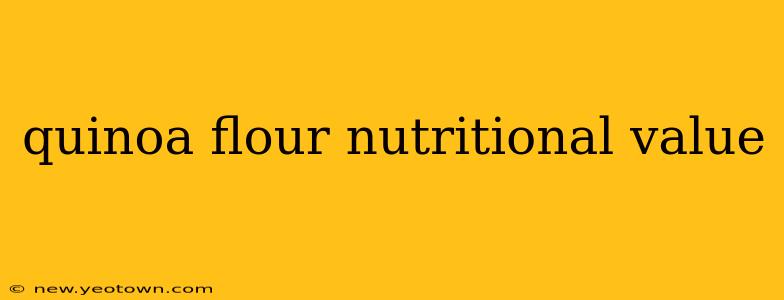Quinoa, a complete protein boasting all nine essential amino acids, has rightfully earned its superfood status. But have you explored the nutritional powerhouse that is quinoa flour? This finely ground wonder offers a unique blend of nutrients, making it a fantastic addition to your baking and cooking repertoire. Let's delve into the details of its nutritional profile and uncover why it’s worth a spot in your pantry.
My journey into the world of quinoa flour began with a simple question: could I replace my usual all-purpose flour with something healthier? The answer, as I soon discovered, was a resounding yes. But it wasn't just about health; the versatility and delightful texture it lent to my baking were unexpected bonuses.
What is Quinoa Flour?
Quinoa flour is simply ground quinoa seeds. Unlike other grains, quinoa is a complete protein, meaning it contains all nine essential amino acids our bodies cannot produce on their own. This makes it a valuable source of protein for vegetarians and vegans alike. The milling process, which reduces the quinoa seeds to a fine powder, makes it easily incorporated into various recipes.
Quinoa Flour Nutritional Value: A Detailed Breakdown
The nutritional value of quinoa flour is impressive. One cup (approximately 150 grams) typically provides:
-
High Protein: Quinoa flour is packed with protein, crucial for building and repairing tissues. This makes it an ideal choice for athletes, those seeking to increase their protein intake, or anyone looking for a more filling alternative to traditional flour.
-
Fiber Rich: This flour is an excellent source of dietary fiber, vital for maintaining healthy digestion and promoting regularity. Fiber also helps regulate blood sugar levels and contributes to a feeling of fullness, aiding in weight management.
-
Rich in Minerals: Quinoa flour is a good source of several essential minerals including magnesium, phosphorus, manganese, iron, and zinc. These minerals play vital roles in various bodily functions, from energy production to immune function.
-
Vitamins Galore: It contains a range of vitamins including folate, vitamin B6, and riboflavin. These vitamins are essential for cell growth, red blood cell formation, and energy metabolism.
-
Iron Content: Quinoa flour provides a decent amount of iron, an essential mineral for carrying oxygen throughout the body.
Frequently Asked Questions (FAQ)
Here are some frequently asked questions regarding quinoa flour’s nutritional value:
Is quinoa flour gluten-free?
Yes, quinoa flour is naturally gluten-free, making it a suitable option for individuals with celiac disease or gluten sensitivity. However, always double-check labels to ensure there's no cross-contamination during processing.
How does quinoa flour compare to other flours nutritionally?
Compared to refined wheat flour, quinoa flour offers a significantly higher amount of protein, fiber, and essential minerals. While it might lack some of the carbohydrates found in wheat flour, these are often less desirable "empty" carbohydrates.
Does quinoa flour have a high glycemic index?
Quinoa flour has a lower glycemic index (GI) than many other flours, meaning it causes a slower and more gradual rise in blood sugar levels. This makes it a better choice for people managing diabetes or blood sugar levels.
Can I use quinoa flour in all recipes?
While versatile, quinoa flour doesn't always work as a 1:1 replacement for all-purpose flour in all recipes. It can be a bit drier, so you might need to adjust liquid amounts in your recipe. It also contributes a slightly earthy, nutty flavor.
What are the potential downsides of quinoa flour?
Some individuals might experience digestive discomfort due to the high fiber content. Starting with small amounts and gradually increasing your intake is advisable to allow your digestive system to adapt. Also, quinoa flour is often more expensive than other flours.
Conclusion: Quinoa Flour – A Healthy Choice
Quinoa flour is a nutritious and versatile flour that offers a variety of health benefits. Its high protein content, rich fiber, and abundance of minerals and vitamins make it a valuable addition to a healthy diet. While it might not be a perfect replacement for all-purpose flour in every recipe, its nutritional advantages and delicious flavor make it a worthy inclusion in your kitchen. So, embrace the nutty goodness and reap the rewards of this incredible superfood ingredient!

